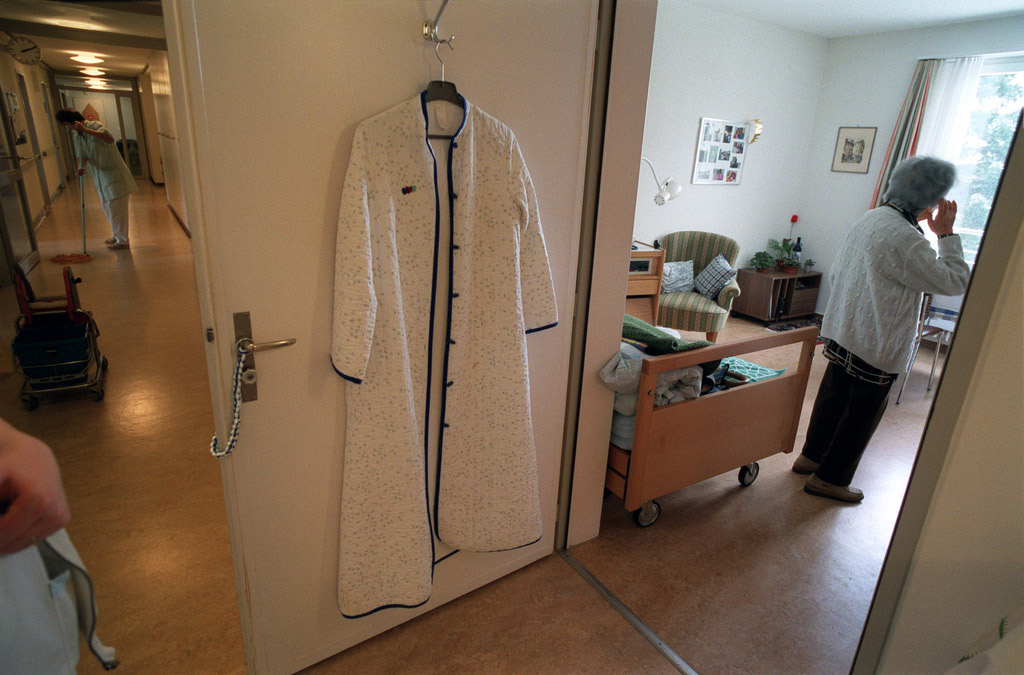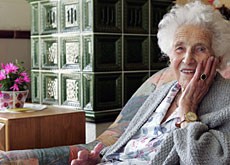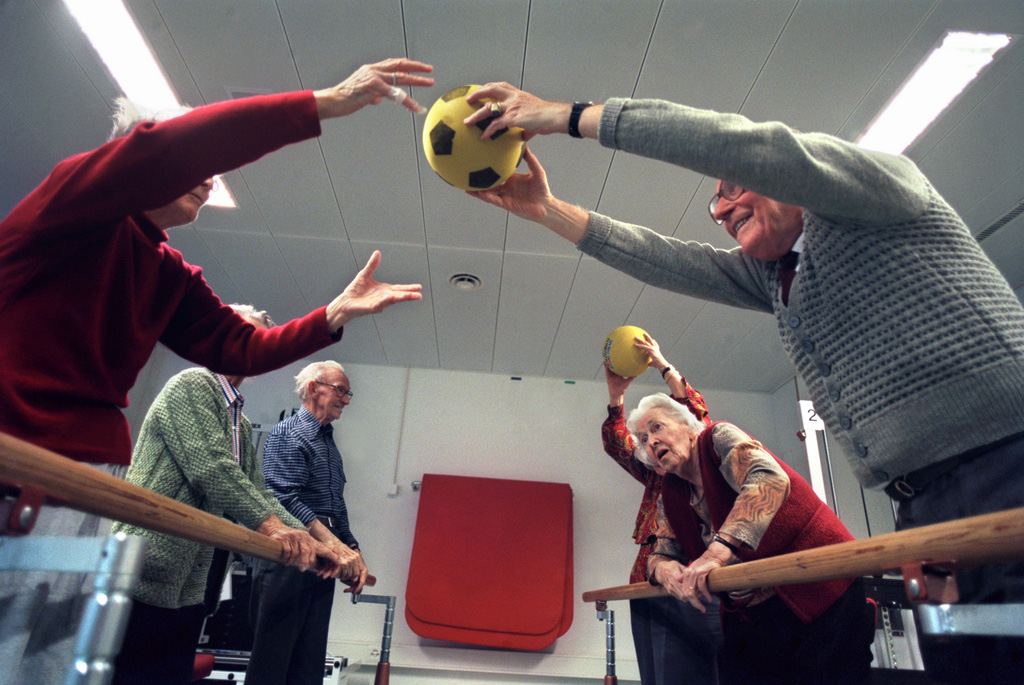Finding ways of growing old gracefully

Some people cannot wait to retire; for others it is an inevitable rite of passage to a precarious future. And while Switzerland is viewed as a good place to grow old, many elderly people also suffer from exclusion, poverty and injustice.
Europe, the “old continent”, is getting older. The European Union declared 2012 ‘European Year For Active Ageing and Solidarity between Generations’. Its goal is “to raise awareness of the contribution that older people make to society” and “create better opportunities for active ageing and strengthening solidarity between generations”.
At a recent national conference organised by Pro Senectute – the biggest Swiss organisation supporting the elderly – entitled “The path to successful ageing”, specialists underlined the urgent need to create or improve ways of ensuring that the ‘golden years’ actually mean that in a rich and modern country like Switzerland.
Addressing conference delegates, Silke van Dyke, a sociologist from the Friedrich Schiller University in Jena, Germany, questioned whether pensioners should be encouraged to be more active.
At the same time she warned: “The social utility of the elderly – in other words their activities – should not be the decisive criteria for a successful old age.”
Ageing on your own terms
Set against a backdrop of extreme cost-cutting and the slow dismantling of social benefits, van Dyke said it was not the behaviour – supposedly passive – of elderly people that was problematic, but their relationships within society.
And she rejected the ‘‘win-win’ notion that associates productive old age with social recognition, defended by politicians and scientists.
Criticising those who are active at all costs doesn’t mean advocating passive old age either. Rather it is “a plea for the creation of suitable conditions to determine how each individual wants to handle their life during retirement”, van Dyke said.
“There are different ways of ageing well and they don’t all involve activity. The important thing is that everyone ages at their own pace and in their own way,” Pro Senectute director Alain Huber told swissinfo.ch. “The important thing is that everyone can be happy as they get older.”
The key to ‘ageing well’
Huber said that the right conditions for ageing well in Switzerland exist now.
“But we must be careful. We know that demographic changes are coming,” he warned. “Many people lack sufficient resources and are on the poverty line despite additional benefits.”
Pasqualina Perrig-Chiello, a professor of psychology at Bern University, said indicators such as physical health, life expectancy or personal satisfaction show that the quality of life of older people has improved considerably in recent decades.
“Old age has been democratised,” said Perrig-Chiello, adding that “inequalities remain essentially linked to individual conditions. There are still vulnerable groups who lack economic, social and physical resources.”
According to Perrig-Chiello, one way of making old age even more democratic would be a participatory process to help focus the debate on the disparity of resources rather than on the differences between ages and generations.
“The injustices experienced by elderly people occur within the same generation and not between generations,” theologian Béatrice Bowald of the Swiss National Commission for Justice and Peace told swissinfo.ch.
Bowald said the commission had proposed introducing a federal tax on inheritances which would be directed into the Swiss pension scheme as a way of bridging the gaps between the rich and poor amongst the elderly, and of ensuring a long-term system of providing for the older generation.
“Only a few people are extremely wealthy and there are many who have nothing,” Bowald said. “This tax would allow for greater justice.”
Wealth and poverty
Monica Budowski, a sociologist at Fribourg University, said within families, solidarity between generations was not at risk thanks to the transfer of knowledge, contacts, forms of behaviour and property. However, outside the family nucleus, the situation was quite different, she said.
“If solidarity existed beyond the family circle, generations would have the same opportunities regardless of how wealthy the family was,” Budowski said.
“Social inequalities persist given the limited financial resources within the family circle. [Financial] inequalities increase with age and reach a peak between 55 to 70 years old.”
Van Dyke regretted that current debate tended to get bogged down over the so-called generation gap, and lose sight of the main point that “greater social inequalities occur when people get old”.
Images of happy retired people, rejuvenated by miraculous, expensive treatments participating in sporting, social and cultural events stand in stark contrast to those of elderly people whose poor education condemns them to menial work and ultimately a shorter life.
But that, said van Dyke, “is one of the great taboos of current discussions about old age and ageing”.
Between three and four per cent of pensioners suffer from poverty, despite receiving additional state benefits.
About 12% of the elderly need additional services and would suffer from poverty without receiving benefits.
The Organisation for Economic Cooperation and Development (OECD) estimates that 18% of the Swiss population suffers from poverty before receiving benefits.
Amongst people aged over 60 there is greater inequality in income and wealth.
While one in seven retired couples has a fortune of more than SFr1 million ($1.03 million), about one in ten has less than SFr10,000.
Source: Pro Senectute
At the start of the 20th century, one in five people in Switzerland were under 20 years old and only one in 17 were over 65 (less than six per cent).
In 2010, the proportion was 20.8 per cent to 17.1 per cent, and for 2035 it is expected to be 19 per cent to 26 per cent.
Life expectancy in 2008 was 84.4 years for women and 79.7 for men, i.e. 20.4 years and 18.7 years respectively, after retirement.
To age well, a safe and durable forecasting system is required, as well as being able to take part in social life and have a positive image of old age.
Pro Senectute: In this time of demographic upheaval the indispensible conditions for social cohesion should not be neglected.
Alain Berset, Swiss Interior Minister: It is not tolerable to have hardship in old age (..) We have to strengthen our wobbly confidence in the AHV, creating all the necessary transparency regarding responsibilities, funding sources and cost factors.
Andreas Kruse (Heidelberg University): ‘Generational tandems’ should be created to increase social and professional cooperation between young and old.
Stefano Cavalli (Geneva University): The common characteristic of the elderly is neither disease nor dependency but fragility.
Sigrun-Heidi Filipp (Trier University): The stereotypes associated with old age won’t disappear until society overcomes its fear of life ending and death.
(Translated from Spanish by Clauda Spahr)

In compliance with the JTI standards
More: SWI swissinfo.ch certified by the Journalism Trust Initiative



You can find an overview of ongoing debates with our journalists here. Please join us!
If you want to start a conversation about a topic raised in this article or want to report factual errors, email us at english@swissinfo.ch.